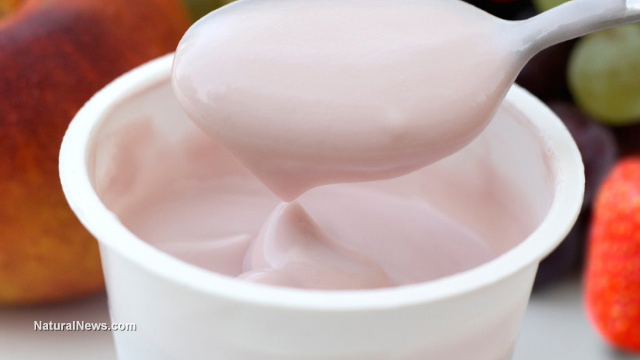Is yogurt the key to reversing depression?
02/20/2019 / By Isabelle Z.

Scientists have long known that depression can affect your body, but is it also possible that your physical health could be the cause of your depression? While there is no doubt that suffering from an illness like cancer or obesity can lead to depression, one big culprit could be a lot less obvious: your gut microbiome.
Your gut is home to 400 species of bacteria and 100 trillion microbes. While this is perhaps not the most appetizing thought, the truth is that these bacteria have the power to make or break your health. The gut’s enteric nervous system connects to your brain through the vagus nerve, which is why sadness and other emotions can affect the gut and vice versa. This is why it is called the second brain.
Now, University of Virginia School of Medicine researchers have been able to reverse the symptoms of depression in mice by having them eat the probiotic in live-culture yogurt known as Lactobacillus. They are optimistic that humans could note a similar effect and the findings could lead to a very safe and effective way to treat depression.
This is great news for the nearly seven percent of Americans who are experiencing a major depressive episode. Even though this is one of the nation’s most common mental health conditions, most of the current treatments available leave a lot to be desired.
Based on their name, many people assume that antidepressants will cure the condition, but the truth is that most are ineffective and they are also responsible for a long list of side effects that are unpleasant at best, and fatal at worst. The idea of eating yogurt to cure depression is a lot more amenable than downing chemical-filled pills that raise your risk of suicide, heart disease, and countless other conditions.
The research team, which was led by Dr. Alban Gaultier, set out to uncover the role of gut health in depression. They found that the big difference between the gut microbiomes of mice, before and after enduring stress, was the loss of Lactobacillus, which spurred symptoms of depression. By feeding Lactobacillus to the mice with their food, they returned to normal.
The brain-gut connection
How exactly does this work? The researchers found that Lactobacillus levels in the gut can impact a metabolite known as kynurenine that drives depression. As Lactobacillus levels in the gut went down, kynurenine levels rose and depression took hold. The change was seen consistently across various experiments and settings, prompting one researcher to comment that there was a direct correlation between Lactobacillus levels and the mice’s behavior.
The researchers now plan to study these effects in humans who are depressed. They’d also like to explore precisely how kynurenine affects the brain. In the meantime, however, eating yogurt that contains Lactobacillus is not a bad idea for people who are suffering from depression. Other studies have found that probiotics can help your body produce feel-good neurotransmitters like GABA and dopamine. Probiotics can be found naturally in foods like kefir, fermented vegetables and kombucha, in addition to yogurt.
Of course, not all yogurts are created equally. Organic yogurt is a must if you want to avoid pesticides and other harmful toxins, but you also need to read the labels very carefully. Most yogurts contain inordinate amounts of sugar, and those that don’t are typically sweetened with dangerous artificial sweeteners. The best course of action is to buy organic plain yogurt – or better yet, make it yourself – and then add the healthy ingredients of your choice. Some people like to add organic maple syrup or honey for flavor, but you could also chop up some organic fruit to create your own flavored yogurt.
Sources include:
Tagged Under: Anxiety, depression, food cures, food is medicine, functional food, gut health, gut microbiome, Lactobacillus, major depressive disorder, natural cures, natural medicine, nutrients, probiotics, yogurt
RECENT NEWS & ARTICLES
COPYRIGHT © 2017 BEATDEPRESSION.NEWS
All content posted on this site is protected under Free Speech. BeatDepression.news is not responsible for content written by contributing authors. The information on this site is provided for educational and entertainment purposes only. It is not intended as a substitute for professional advice of any kind. BeatDepression.news assumes no responsibility for the use or misuse of this material. All trademarks, registered trademarks and service marks mentioned on this site are the property of their respective owners.



















